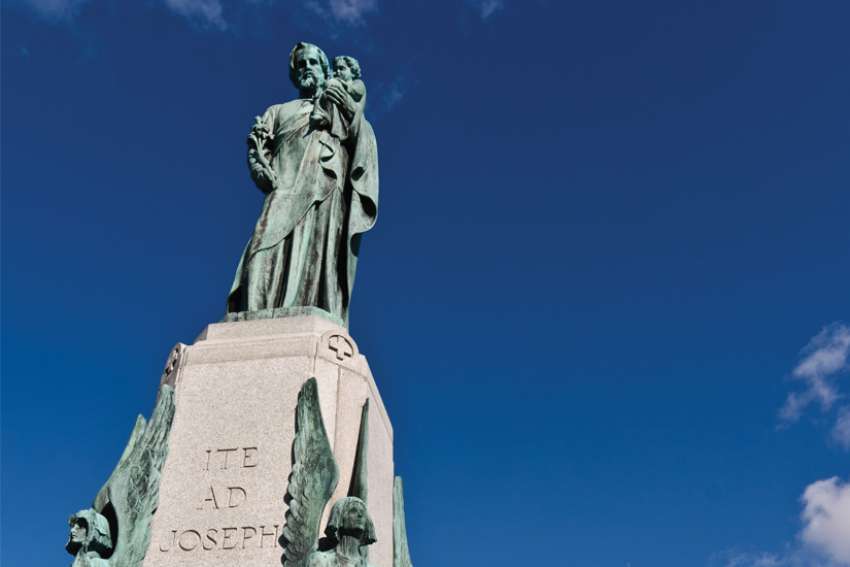I ask because perhaps it is time to entrust the cause of St. Joseph in Canada to St. Jude, patron saint of hopeless causes.
Please permit a word of explanation. More than 10 years ago, on the occasion of the canonization of St. André Bessette of Montreal, I called for making the solemn feast of St. Joseph (March 19) a holy day of obligation in Canada. He is the patron saint of Canada and patron of the universal Church. St. André’s great work, St. Joseph’s Oratory on Mount Royal, is the largest shrine to St. Joseph in the world.
In this Year of St. Joseph, the pandemic has unfortunately put paid to the annual celebrations for the feast at the Oratory. But why not decide this year to make St. Joseph’s feast a holy day of obligation and celebrate it for the first time next year, when the Oratory and churches across the land will be back to normal? It would be a fitting legacy of the Year of St. Joseph.
The argument that the feast of the national patron, in the country where his greatest shrine is established, should be observed as a holy day like Sunday, does not seem to garner much disagreement in principle. But inertia is powerful.
St. Joseph’s feast is a holy day of obligation on the calendar of the universal Church, observed in Rome. There are 10 such days for the universal Church. Four are feasts of the Lord Jesus: Christmas, Epiphany, Ascension and Corpus Christi. Three are feasts of Our Lady: Immaculate Conception (Dec. 8), Mother of God (Jan. 1), and the Assumption (Aug. 15). Three relate to the other saints: Joseph (March 19), Peter and Paul (June 29) and All Saints (Nov. 1).
Each country’s bishops are permitted to make additions and subtractions. For example, in Ireland the feast of St. Patrick is a holy day. The absolute minimum allowed is two: Christmas and one Marian day. Generations ago the Canadian bishops opted for that minimum, so we only have Christmas and Mary, Mother of God (Jan. 1).
Along with the Australians, we are the bottom-dwellers of the Catholic world when it comes to holy days. But even the Australians are slightly better off, in that their Marian day is the Assumption, Aug. 15. Ours is Jan. 1, poorly attended by even faithful Catholics, and confused in the minds of many with New Year’s Day, a civic observance.
The Vatican declared a Year of St. Joseph to mark the 150th anniversary of his designation by Blessed Pius IX as patron of the Universal Church in 1870. This special year invites us to renew again our trust in his powerful intercession as patron and protector.
In 1989, St. John Paul II wrote an apostolic letter on St. Joseph, Redemptoris Custos, Guardian of the Redeemer. He explained the importance of Joseph’s patronage:
“This patronage must be invoked as ever necessary for the Church, not only as a defence against all dangers, but also, and indeed primarily, as an impetus for her renewed commitment to evangelization in the world and to re-evangelization in those lands and nations where religion and the Christian life were formerly flourishing and... are now put to a hard test.”
Is there any place on Earth where that is more true than Quebec, home of St. Joseph’s Oratory?
The advice that Brother André gave to the thousands upon thousands who came to see him remains valid today — Go to Joseph! A good beginning might be for us to go to Mass on St. Joseph’s feast as we do on Sunday.
Yes, it is true that many Sunday Mass-attending Catholics will ignore the obligation, and our churches on March 19 may not be any more full than they are now on Jan. 1. But why make mediocrity the standard? That option surely has been tried and found wanting, so perhaps raising the bar wouldn’t hurt.
In his letter on St. Joseph for the anniversary last December, Pope Francis revealed that he includes a prayer to St. Joseph as part of his daily morning prayers. It begins: “Glorious Patriarch St. Joseph, whose power makes the impossible possible.”
So perhaps recourse to St. Jude is not necessary?
(Fr. de Souza is editor-in-chief of Convivium.ca and a pastor in the Archdiocese of Kingston.)

